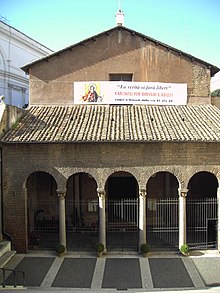San Vitale, Rome

San Vitale is a basilica church in Rome. Its alternative names are Santi Vitale, Valeria, Gervasio e Protasio or Santi Vitale e Compagni Martiri in Fovea.
The basilica was built in 400, and consecrated by Pope Innocent I in 401/402. The dedication to St. Vitalis and his family (Saint Valeria, his wife, and Sts. Gervasius and Protasius, their sons) is dated to 412. This church is recorded as Titulus Vestinae in the acts of the 499 synod of Pope Symmachus, and three presbyters are listed.
San Vitale was restored several times, the most important being the rebuilding by Pope Sixtus IV before the Jubilee of 1475, and then in 1598, 1938 and 1960. The church is currently located several metres under the street (via Nazionale) level. Pope Pius IX built the staircase to the 5th century portico in 1859.

The church is on a single nave, with walls frescoed with scenes of martyrdom, among which a Martyrdom of St Ignatius of Antioch, in which a ruined Colosseum is depicted.
The apsis, original of the 5th century, is decorated with a fresco by Andrea Commodi, the The Ascent to Calvary.
The Cardinal Priest of the Titulus S. Vitalis is Adam Cardinal Maida. Among the previous titulars, Gennaro Cesio, appointed in 494 by Pope Gelasius I, and St. John Fisher, martyred in 1535 by Henry VIII.
Free bread was distributed to the poor by the church according to the will of a Roman nobleman, Francesco Silla.
